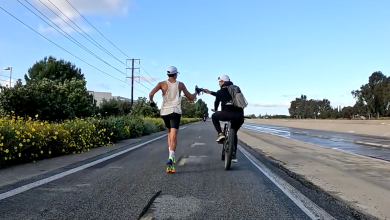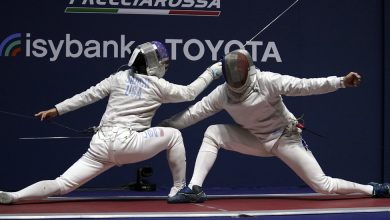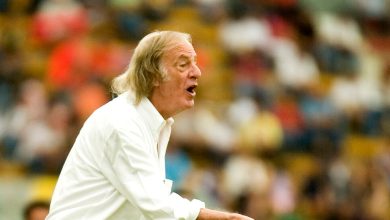A Ukrainian Racer’s Olympic Fight Brings Pride but Also Guilt

Vladyslav Heraskevych, who became Ukraine’s most famous Olympian in 2022 because of the antiwar sign he held in front of a television camera days before Russia invaded his country, feels the guilt come in waves.
They are especially powerful when the bad news from the front lines reaches him, as it did last month, when he learned that his friend and teammate at the Youth Olympic Games, the figure skater Dmytro Sharpar, died in combat near Bakhmut. Sharpar was 25.
Days later, another top Ukrainian athlete, the decathlon champion Volodymyr Androshchuk, also died in fighting near Bakhmut. He was 22.
“It is very hard to understand how these people sacrificed their lives while you are doing sport,” Heraskevych said from Austria during an interview earlier this month, after competing in a skeleton race on the World Cup circuit. He was in Latvia last week for the season’s final competition.
In any country enduring a war, especially Ukraine, where missiles rain indiscriminately across civilian areas and uncontested cities hundreds of miles from the battlefields, there is a never-ending tension between total dedication to the fight and the need for small slivers of normalcy. Children still need to go to school. When air-raid sirens are quiet, adults try to salvage livelihoods and gather in cafes or pubs, even as their friends and relatives are sleeping in frozen trenches. On fields across the world, pro athletes play sports.

In Kharkiv, Ukraine, plastic wreaths cover graves in a cemetery dedicated to Ukrainian service members killed in the war.Credit…Nicole Tung for The New York Times
Like Heraskevych, many of them question why they are not fighting alongside their friends. They try to hold the line in the Donbas. He travels to Switzerland and Lake Placid, N.Y., to compete and to cities far from the front lines to run sports clinics for children. Government officials tell him to keep going, that without him skeleton would not exist in Ukraine. Sometimes he’s not sure they are right.
The State of the War
- Portending a Global Rift: Secretary of State Antony J. Blinken said that China is strongly considering giving military aid to Russia, a move that would transform the war into a struggle involving three superpowers.
- Western Support: Nearly one year into the war, American and European leaders pledged to remain steadfast in their support for Ukraine amid worries about how long their resolve will last.
- Harris’s Comments: Vice President Kamala Harris declared that the United States had formally concluded that Russia had committed “crimes against humanity” in its invasion of Ukraine.
- A Russian Mole in Germany?: A director at Germany’s spy service was arrested on suspicion of passing intelligence to Russia. German officials and allies worry just how deep the problem goes.
“They tell me that like the president has said, I should keep doing it because sport is also Ukraine, that it would be bad if all we had was people fighting on the front lines,” he said. “We are also fighting to save culture, and life.”
Unlike other notable sports figures from Ukraine, including the retired tennis player Sergiy Stakhovsky, Heraskevych has yet to fire artillery or serve near the front lines. Earlier this month, President Volodymyr Zelensky of Ukraine told a meeting of sports ministers from allied countries that during the past year 228 athletes and coaches have died.
Heraskevych knew many of them, though he has tried to serve the country in other ways.
In the first days of the war, he and his father converted the van that once carried their sleds into a mobile relief vehicle. Since then, he has started a foundation and worked closely with other organizations to supply medical aid and other forms of humanitarian relief, including food and clothing.
His organization, the Heraskevych Charity Foundation, worked to secure six tons of supplies from Portugal last year, and has coordinated with Little Wing Relief Works in the United States to secure additional supplies. His efforts have helped bring six medical tents and generators that serve as mobile medical units near combat zones, where medics perform triage on injured soldiers before they are transported to hospitals. He has built a relationship with Dmitry Feld, the longtime marketing manager ofU.S.A. Luge, who grew up in Kyiv and has helped spearhead much of Little Wing’s support efforts. Heraskevych is also among the leading voices in Ukraine’s efforts to keep Russia and Belarus out of international sports, especially the Olympics.
Heraskevych has one top-10 finish in a World Cup race and was 13th at the world championships. He barely trained last summer and his mind often drifts elsewhere during competitions, even sometimes as he sprints down the ice and prepares to dive onto his sled.
“Maybe we will work more in the off-season,” he said. “We will see.”
Other than the existential threat he and his country face each day, his biggest concern is making sure Russian and Belarusian athletes remain suspended from international competition in most sports and are not allowed to compete in the Olympic Games while the war continues.
He worries little about doomsday predictions of the collapse of international sports if athletes are punished for the policies of their governments, pointing to the years following World War II, when athletes from Germany and Japan were prohibited from competing in the 1948 Olympic Games.
“Nobody questioned it,” he said. “Now they say athletes are not guilty, that they are victims of the system.”
Heraskevych, other Ukrainian athletes and sports officials, and representatives from other countries have gone on the offensive in recent weeks after Thomas Bach, the president of the International Olympic Committee, said officials were working to find a way for Russian and Belarusian athletes to compete at the 2024 Paris Games as so-called neutral participants.
In December, Bach said in a news conference, “Participation must happen on sporting merits.”
After the I.O.C.’s January announcement that it was working to allow athletes from Russia and Belarus to compete, officials in Ukraine threatened to lead an Olympic boycott. That prompted the I.O.C. to issue a statement calling that threat “extremely regretful.”
Ukraine has not been deterred. On Friday, Zelensky addressed a group of about 30 sports ministers and government officials, including representatives of some of the most prominent countries in the Olympic movement, like the United States, Britain, France, Germany and Norway.
“The International Olympic Committee needs honesty,” Zelensky said. “Honesty it has unfortunately lost.”
In a statement after the meeting, the group said it planned to call on the I.O.C. “in the coming days” to bar athletes from Russia and Belarus from international sports as long as their nations are engaged in the war in Ukraine.
For now, the United States has supported the continued suspension, but the country’s diplomats have also left the door open for discussions on the matter. The U.S. representative at the meeting, Lee Satterfield, an assistant secretary of state for education and cultural affairs, reiterated the country’s previous statements on participation by Russian and Belarusian athletes.
A State Department spokesman said on Feb. 10 that the government would continue to consult with the U.S. Olympic and Paralympic Committee and seek “greater clarity” from the I.O.C. regarding any plans to allow Russian and Belarusian athletes to compete.
In pushing for the continued ban of Russians and Belarusians from numerous international sports, Heraskevych said he did not want to hurt individual athletes but said Russia would inevitably use its participation as propaganda.
He pointed to two examples from this year’s Australian Open as prime opportunities for Russia’s state-run media to show that most of the world no longer opposed the war: the video of the father of the Serbian tennis star Novak Djokovic with fans holding Russian flags and the pro-war Z symbol and the women’s singles final between a native-born Russian and a Belarusian. Likewise, an American and a Russian on an Olympic podium could suggest to the Russian people that the war has been “normalized.”
Heraskevych said the proposal for Olympic officials to allow only athletes who had not actively supported the war was absurd.
“Is that fighting on the front lines, or collecting money to support soldiers, or showing the Z symbol on social media,” he asked. “And how can we check on any of this? You are going to have athletes who have been trying to kill Ukrainian civilians competing.”




